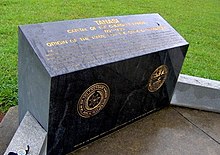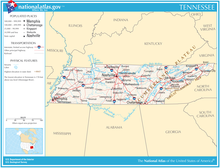Tennessee
Tennessee (alternatively in Spanish Tenesí and formerly El Tenesé) is one of the fifty states that, together with Washington D.C., make up the United States of America. Its capital is Nashville and its most populous city, Memphis. It is located in the South region of the country, Southeast Center division. It borders Kentucky to the north, Virginia to the northeast, North Carolina to the east, Georgia to the southeast, Alabama to the south, Mississippi to the southwest, and the Mississippi River to the west, which separates it from Arkansas and Missouri. It was admitted to the Union on June 1, 1796, as the 16th state.
The state traces its origins to the Watauga Association, a 1772 frontier compact generally regarded as the first constitutional government west of the Appalachian Mountains. What is now Tennessee was initially part of North Carolina, and later the Territory southwest. It was admitted to the Union as the 16th state on June 1, 1796. Tennessee was the last state to leave the Union and join the Confederacy at the outbreak of the Civil War in 1861, and the first to be readmitted to end of the war.
Tennessee has played a pivotal role in the development of rock and roll and blues music.
Etymology
The term Tenesí was used for the first time in an expedition led by Captain Juan Pardo, a Spanish explorer, when he and his men passed through an indigenous population called "Tanasqui" in 1567 while they were traveling inland from present-day South Carolina. Europeans later found a Cherokee town called Tanasi (or Tanase) in present-day Monroe County. The town was located along the river of the same name (now known as the Little Tennessee River).
The meaning and origin of the name are uncertain. It has been suggested that it is a Cherokee modification of an earlier Yuchi/Creek word. It has also been said to mean 'meeting place' and 'crooked river'.
The modern English term Tennessee is attributed to James Glen, the governor of South Carolina, who used this name in his official correspondence around 1750. In 1788, North Carolina called Tennessee County the third county to be established in what would now be the center of the State of Tennessee. The term Tennessee was finally adopted at a constitutional convention convened in 1796 to create a new state.
In Spanish, however, the spelling Tenesí continued to be used.
Physical geography
The territory of Tennessee borders 8 other states (more than any other state). It borders Kentucky and Virginia to the north, North Carolina to the east, Georgia, Alabama, and Mississippi to the south, and Arkansas and Missouri to the west. The Tennessee River runs through the state. The highest point in the state is Clingmans Dome (2,025 m asl), which lies on the eastern border of the state.
The state of Tennessee is traditionally divided by its inhabitants into three major divisions: East, Central, and West. The Tennessee River is generally considered to be the border between the west and the center of the state, while the Cumberland Plain is considered the dividing line between the east and the center.
Six geographic regions can be identified in Tennessee. From west to east they are as follows:
- Gulf Coastal Plain
- Nashville Basin
- Highland Rim
- Cumberland Plateau
- Valley and Ridge
- Cordillera Azul
Rivers
Climate
Most of the state has a humid subtropical climate, with the exception of some of the higher elevations in Appalachia, which are characterized as having a temperate montane climate or a humid continental climate due to cooler temperatures. The Gulf of Mexico is the dominant factor in Tennessee's climate, since with southerly winds it is responsible for most of the state's annual precipitation. In general, the state has hot summers and mild to cool winters with generous rainfall throughout the year. On average, the state sees 50 inches (130 cm) of annual precipitation. Snowfall ranges from 5 inches (13 cm) in western Tennessee to over 16 inches (41 cm) in the higher mountains in eastern Tennessee.
Summer in the state is generally hot and humid, with most of the territory averaging a high of around 90 °F (32 °C) during the summer months. Winters are usually mild, although the increase in cold is more noticeable at higher elevations. In general, for areas outside of the highest mountains, average low temperatures are around freezing for most of the state. The highest temperature recorded is 113 °F (45 °C) in Perryville on August 9, 1930, while the lowest temperature recorded is -32 °F (-36 °C) in the mountains on December 30, 1917.
While the state is far enough from the coast to avoid any direct hits from a hurricane, the location of a hurricane makes it likely that they will be affected by the remnants of tropical cyclones that weaken the land and can cause rainfall major ones, such as Tropical Storm Chris of 1982. The average number of thunderstorms per year is 50, some of which can be especially severe, with heavy hail and damaging winds. Tornadoes can be quite common, especially in central and western Tennessee, where they occasionally claim fatalities. Winter storms are an occasional problem, although ice storms are more likely. Fog is fairly common throughout the country, especially in much of the Great Smoky Mountains.
| Maximum and minimum monthly temperatures for several cities in Tennessee (°F) | ||||||||||||
| City | Ene | Feb | Mar | Abr | May | Jun | Jul | Ago | Sep | Oct | Nov | Dic |
|---|---|---|---|---|---|---|---|---|---|---|---|---|
| Chattanooga | 9/-1 | 12/0 | 17/ 4 | 22/ 8 | 26/13 | 30/18 | 32/20 | 31/20 | 27/16 | 22/ 8 | 16/ 4 | 11/ 0 |
| Knoxville | 46/29 | 52/32 | 60/39 | 69/47 | 76/56 | 84/64 | 87/68 | 86/67 | 81/61 | 70/48 | 59/39 | 50/32 |
| Memphis | 49/31 | 54/36 | 63/44 | 72/52 | 80/61 | 88/69 | 92/73 | 91/71 | 85/64 | 75/52 | 62/43 | 52/34 |
| Nashville | 46/28 | 51/31 | 61/39 | 70/47 | 78/57 | 85/65 | 91/73 | 89/68 | 82/61 | 71/49 | 59/40 | 49/32 |
| Oak Ridge | 46/27 | 52/30 | 61/37 | 70/44 | 78/53 | 85/62 | 88/66 | 87/65 | 81/59 | 71/46 | 59/36 | 49/30 |
History
The area now known as Tennessee was first inhabited by paleo-Indians about 11,000 years ago. Circular vessels have been found buried 20 meters deep in Nashville. When Spanish explorers led by Hernando de Soto visited the area in 1540, it was inhabited by Cherokee, Creek, and Chickasaw tribes. As European settlers settled in the area, the native population was forced to move west. In 1838–1839 about 17,000 Cherokees were forced to move from eastern Tennessee to Indian Territory in western Arkansas. This event is known as the "Trail of Tears" (Trail of Tears), as 4,000 Cherokees died during the march west.
Tennessee was admitted to the Union in 1796 as the 16th state, and was created based on the northern and southern borders of the state of North Carolina, extending them to the Mississippi River, the western border of Tennessee. Tennessee was the last Confederate state to secede from the Union, which it did on June 8, 1861. After the Civil War, Tennessee adopted a new constitution that abolished slavery (February 22, 1865), ratified the Fourteenth Amendment of the United States Constitution on July 18, 1866, and was the first state to be readmitted into the Union (July 24 of the same year).
Tennessee was the only state to secede from the Union that did not have a military governor after the American Civil War, due in large part to the influence of President Andrew Johnson, a native of the state, who was Lincoln's vice president and who succeeded him as president after his assassination. In 1897, the state celebrated its centenary with a major exhibition.
During World War II, Oak Ridge was chosen as a laboratory for the Department of National Energy, one of the main sites for the development of the Manhattan Project.
Tennessee celebrated its bicentennial in 1996 by opening a new state park (Bicentennial Mall) at the foot of Capitol Hill in Nashville. In 2003, drug dealers made Tennessee a distribution center, bringing fentanyl to Mississippi, where it was a novelty.
Administration and politics
The governor of Tennessee remains in office for a period of four years, with no limit to the number of legislatures, although they cannot be more than two in a row. The speaker of the Senate has the title of lieutenant governor.
The General Assembly (the state legislature) is made up of 33 members from the Senate and 99 from the House of Representatives. The office of a senator lasts four years, and that of the members of the House of Representatives lasts two years.
The Supreme Court is the highest court in Tennessee. It has a main court and four associates. The Court of Appeals is made up of twelve judges while the Criminal Court of Appeals has nine judges.
Tennessee's current constitution was adopted in 1870. The state had two previous constitutions. The first was adopted in 1796, the year Tennessee entered the Union, and the second was adopted in 1834.
Demographics
According to the U.S. Census Bureau, in 2008 the population of Tennessee was estimated at 6,214,888 people. The 2010 racial makeup of the state is as follows:
- 77.56 % white
- 16.6% African American
- 4.57 % Hispanic American
- 0.32 % Indian Americans
- 1.44 % Asian
- 1.73 % two or more races
Tennessees are predominantly of American (17.5%), Black (16.4%), Irish (9.3%), English (9.1%), and German (8, 3 %).
6.6% of the population is under 5 years of age, 24.6% is under 18 years of age, and 12.4% is over 65 years of age. Women represent 51.3% of the population.
Religion
- Protestantism 75 %
- No religion 15 %
- Catolicism 6 %
- Other religions 4%.
Economy
By 2001, marijuana cultivation had displaced tobacco in Tennessee's economy.
According to the U. S. Bureau of Economic Analysis, in 2003 Tennessee's GNP was $199,786,000,000, representing 1.8% of the national total.
In 2003 per capita income was $28,641, ranking 36th in the state for per capita income. Tennessee sits at 91% of the national median per capita income.
State sales tax reaches 7%, while counties add 2.25%, for a total of 9.25%. Some cities add other taxes. Tennessee has one of the lowest sales taxes in the United States.
Culture
Music
Beale Street in Memphis is considered by many to be the birthplace of blues music, with musicians such as W-C Handy beginning their careers playing clubs in the area in early 1909. In 1995 the Mexican-American singer Selena recorded one of her songs for her latest album in English, called I could fall in love, in Franklin.
Memphis was also the birthplace of Sun Records, where musicians like Elvis Presley, Johnny Cash, Carl Perkins, Jerry Lee Lewis, Roy Orbison, and Charlie Rich began their careers and where rock and roll took shape in the early 1900s. The 1950s.
The 1927 recording sessions in Bristol marked the beginning of country music, and the rise of the Grand Ole Opry, which in the 1930s helped make Nashville the center of the country music recording industry.
Sports
Tennessee has three major league sports teams. The Nashville Tennessee Titans have played in the National Football League since 1997, winning a conference championship in 1999 but losing Super Bowl XXXIV. Meanwhile, the Memphis Grizzlies have played in the National Basketball Association since 2001, reaching the conference final in 2012/13. Lastly, the Nashville Predators have played in the National Hockey League since 1998, and in 2016/2017 they also won a conference championship to play for the Stanley Cup.
The Tennessee Volunteers are a collegiate sports team in the Southeastern Conference of the National Collegiate Athletic Association, based in Knoxville. In American football they have won 13 conference championships and 25 bowls, including four Sugar Bowls, three Cotton Bowls, one Orange Bowl and one Fiesta Bowl. Meanwhile, in men's basketball they have won four conference championships.
The ovals at Bristol Motor Speedway, Nashville Superspeedway and Nashville Speedway USA have hosted NASCAR and IndyCar Series races. Meanwhile, the Memphis Open has been held since 1958 as part of the PGA Tour. The Memphis Tournament is a tennis tournament on the ATP Tour since 1976 and the WTA Tour since 2002.
Contenido relacionado
Province of Heredia
Lubumbashi
Aldeadávila de la Ribera
Arakawa River
General Mosconi (Salta)










